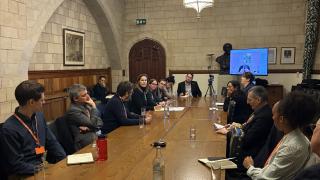On 19 February the All-Party Parliamentary on the UN met to launch UNA-UK’s latest report “Global Britain in the United Nations.” Chaired by Lord Hannay, the meeting brought together UNA-UK, the report’s three co-authors, representatives from civil society, former diplomats and UN officials, and the Foreign and Commonwealth Office, to discuss the future of Britain’s global influence.
Lord Hannay opened the debate then handed to Lead Author, Dr Jess Gifkins, Lead Researcher, Professor Jason Ralph, and Researcher Dr Sam Jarvis. The co-authors presented the report, stressing that the UK will face considerable challenges in maintaining its current level of influence as a result of Brexit.
Professor Ralph and Dr Gifkins reiterated the opinion expressed by many interviewees in praise of the professionalism and skill of British civil servants in New York. They quoted a foreign diplomat who observed that the UK is “one of the most fair players,” and another who said they were “top of the league.”
However, Dr Gifkins noted that a proposed exit from the EU means “the UK’s reputation as a competent and effective international actor has been weakened.”
This conclusion formed the basis of the policy recommendations from UNA-UK, which were then outlined by our Head of Policy, Fred Carver.
He addressed two areas UNA-UK believes must be prioritised in order to make Global Britain a success: consistency and investment.
Mr Carver outlined how UNA-UK, through its campaign Keeping Britain Global, has long maintained that the UK’s strength in global forums rests in part upon “a principled and consistent foreign policy that espouses national values.” Adding that another vital element is the need for constant investment “in the health of the system.”
Both Mr Carver and the report’s authors highlighted concerns over the Government’s apparent lack of strategic thinking regarding its foreign policy.
Dr Jarvis suggested the UK needs to focus on the purpose and direct policy of the “Global Britain” strategy, necessitating a more honest discussion over whether this slogan is merely a rebrand or a genuine starting point for policy conversations that will redefine UK Foreign Policy.
While addressing their critical findings, there emerged a clear consensus among panellists and discussants, on the importance of the UK’s diplomatic skill and the soft power of the United Nations.
Some, including Labour UN Spokesperson Helen Goodman MP, argued that the “Global Britain” slogan is little more than rhetoric. Others pointed to concrete investments in diplomacy in recent years, such as the hiring of 1000 new diplomats - including much needed reinforcements to the UK mission in New York - a firm commitment to the 0.7% of ODI, and a doubling of contributions to UN Peacekeeping.
Experts and practitioners indicated that being effective in multilateral forums was partly about experience and longevity of service, and partly about knowing when to “lead from the back” by being open to the good ideas of others and then putting your nation’s weight behind it.
This is particularly important for a nation like the UK, a former imperial power and permanent member of the UN Security Council. The UK’s historical baggage makes listening to others even more important, while its historical privilege makes doing so even more mutually beneficial.
Responding, James Karuiki, Multilateral Policy Director at the Foreign & Commonwealth Office, said that the “Global Britain” phrase represented a commitment to the international community that the United Kingdom had no intention of turning inwards.
Mr Karuiki acknowledged the difficulties caused by limited resources and the UK’s unique history, but nevertheless made the case that the UK finds ways to add value to international forums, and develops significant diplomatic clout by doing so.
The Report:
Statements:






